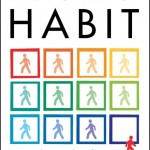Want to NOT eat cupcakes/chocolate/ice-cream in front of the nine o’clock murder drama every night? The new science of habit change can help
There’s a reason most new year’s resolutions fail, why toddlers eat the dirt they’ve just been told to leave alone and why the day after you gave up raiding the kids’ dirty chocolate stash you’re shoving a Milky Way mini into your gob come 9pm. The human brain isn’t wired to be told what not to do. Good news is, whether you want to give up nail-biting, swearing or Twix bars, the new science of habit change can help. Here’s how:
1. IDENTIFY YOUR CUES
Imagine your habit as a circle that begins with a cue, says Charles Duhigg in his book The Power of Habit (£8.99 Random House from amazon). For example, the telly chocolate monster’s cue could be feeling tired, wired or stressed after work. Then comes the routine – for example, watching the murder drama and eating the chocolate. ‘Finally, there’s the payoff of the habit; the reward,’ he explains. ‘That’s the real comfort and sedation that chocolate brings to the brain’.
2. CHANGE YOUR ROUTINE
‘If you use the same cue and provide the same reward, you only need change the routine and you’ll change the habit,’ says Duhigg. ‘Almost any behaviour can be transformed if the cue and reward stay the same.’ The Cadbury’s telly inhaler then, who feels uncomfortable or wired after work (that’s her cue, remember) might change her routine by skipping the telly and seeing a friend, having a phone chat, donning some lycra and attending a roller disco or taking up charity quilting – anything that rocks her world and makes her feel relaxed and comforted. It sounds worthy but ten minutes of mindfulness meditation – Ruby Wax is a fan – is so comforting and you’ll be finished in time for Scott & Bailey. ‘Anything that changes the routine but provides the same reward will work’.
3. ITCH THE ITCH. LITERALLY
So you’re itching to eat just one square. Before one turns into the whole block try the ‘competing response’. That’s psyche-talk for doing something physical. Don’t panic, we’re not talking running or even going outside. It only needs to provide a quick physical stimulation such as scratching your arms (gently) or rapping your knuckles on the sofa. ‘Anything that provides a physical response will work,’ says Duhigg.
4. WORD MASH
Working to end a longstanding habit may involve feelings of deprivation – but don’t get sulky. Voicing a choice to sidestep your old habit is empowering. A study in the Journal Of Consumer Research found a quick language shift such as saying ‘I don’t eat sugar,’ instead of ‘I can’t eat sugar’ helped people stick to their goals. Now repeat after us…I don’t eat Milky Way minis. I don’t. I don’t….

Like this article? Sign up to our newsletter to get more articles like this delivered straight to your inbox.




















































